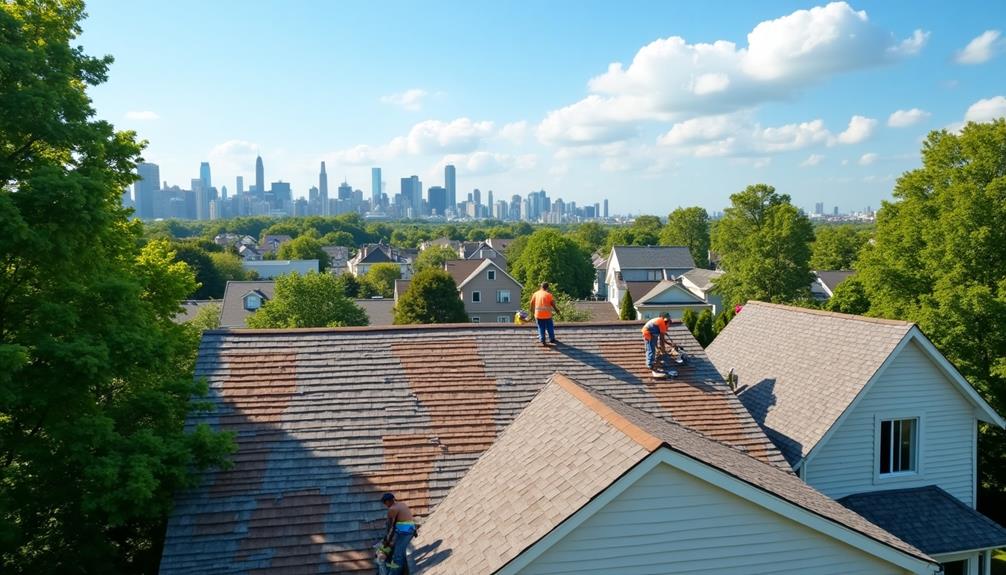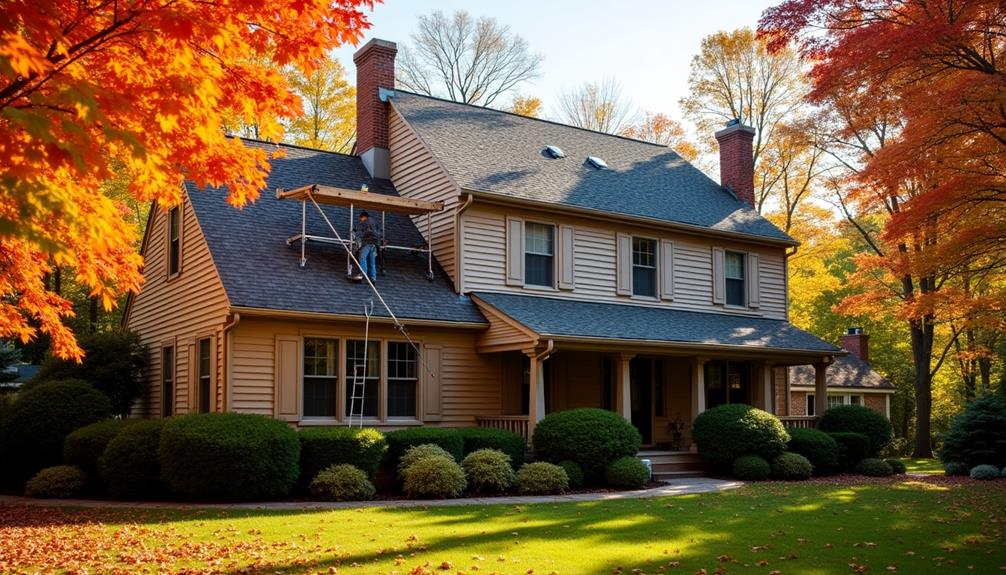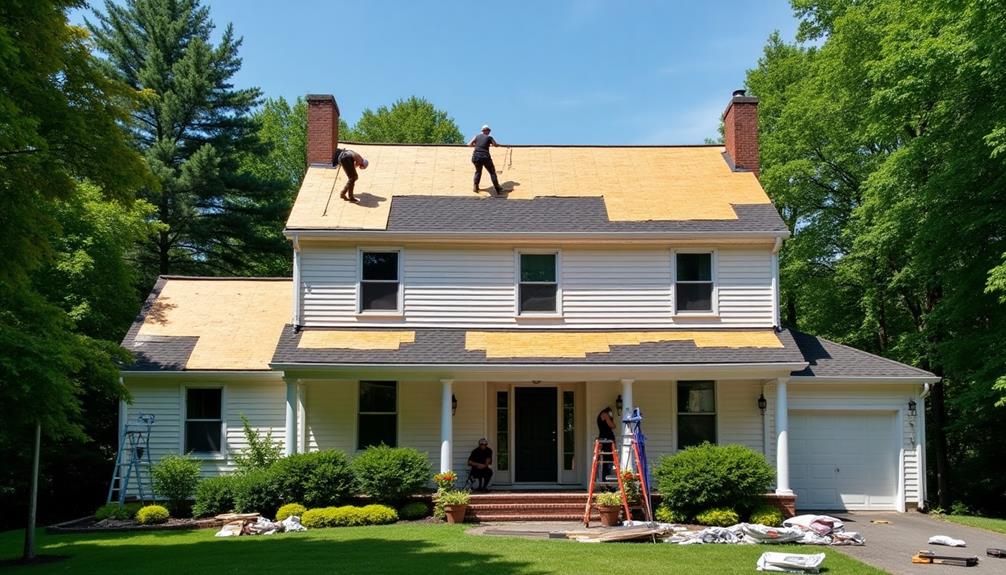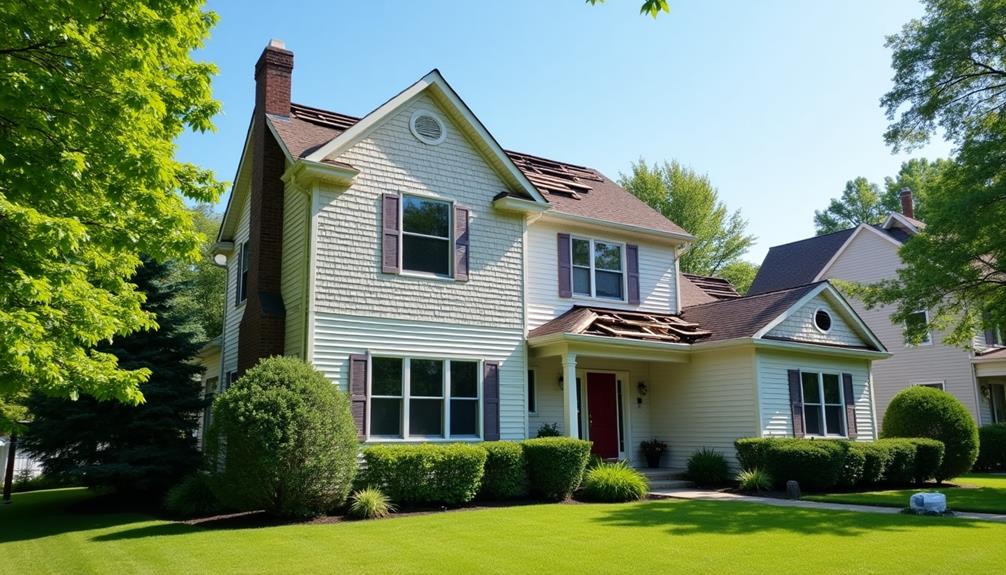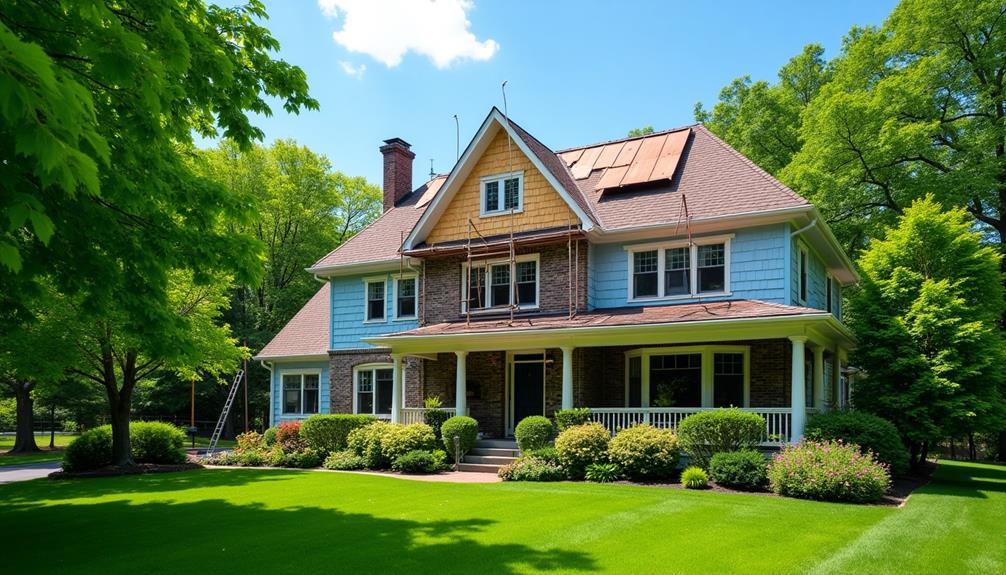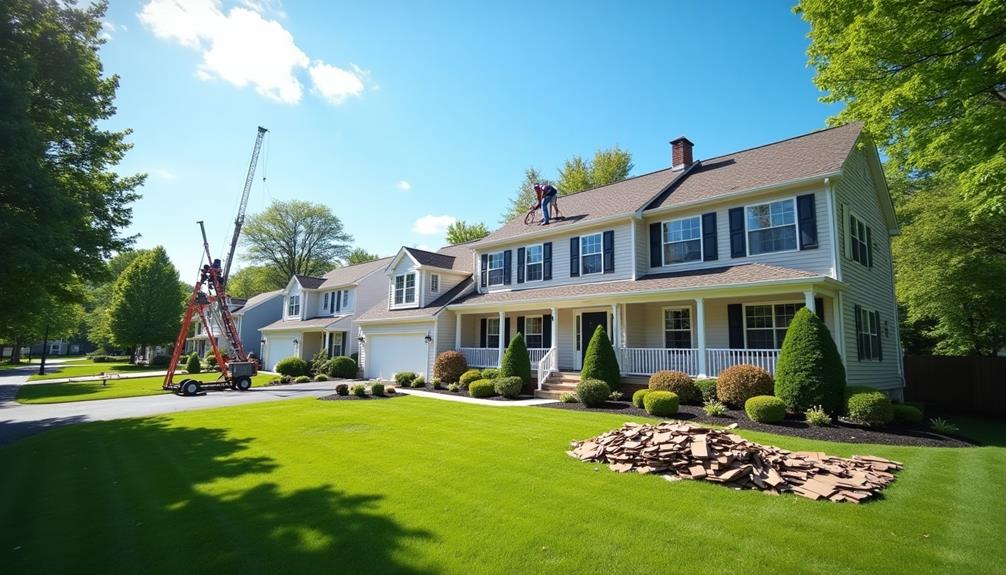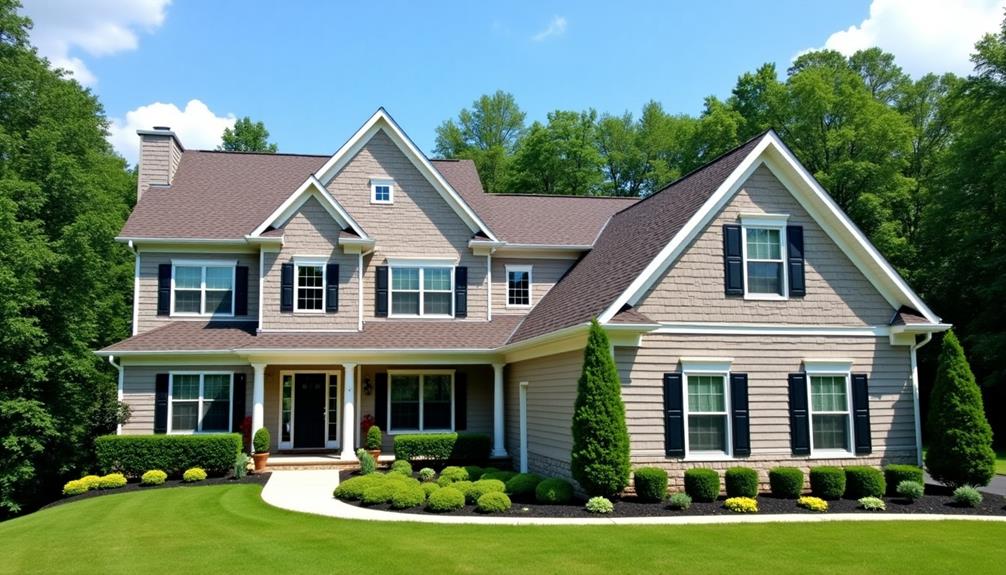If you're considering roof replacement in West New York, NJ, it's crucial to understand the signs that signal a need for a new roof, like missing shingles or water stains. Roofs often face wear from heavy storms and humidity, so knowing your materials is key; asphalt shingles might last about 20 years, while metal could last 50+. Choosing a qualified contractor ensures you get quality work that adheres to local regulations. Regular inspections and maintenance can help extend your roof's life and efficiency. Discover more essential considerations for your roof replacement journey before making a decision.
Signs You Need a New Roof
When it comes to maintaining your home, a well-functioning roof is crucial. You mightn't realize it, but the signs that you need a new roof can be subtle yet significant.
Start by checking for missing or damaged shingles, as these can compromise your roof's integrity. Look for discoloration or stains on your ceiling, which often indicate water leaks. Peeling paint or warped siding can also signal that moisture is seeping in.
Another important factor is roof color. A roof that's faded or discolored may not only detract from your home's aesthetic but also impact its energy efficiency.
Lighter colors reflect sunlight, keeping your home cooler and reducing energy costs. If your roof has darkened over time, it could be absorbing more heat, leading to higher cooling bills.
Understanding Roof Lifespan
Understanding the lifespan of your roof is essential for effective home maintenance and budgeting. Roof aging occurs naturally over time, influenced by various lifespan factors that can significantly impact its durability. Knowing these factors helps you make informed decisions about repairs or replacements.
First, consider the materials used in your roof. Some materials, like asphalt shingles, typically last around 20 years, while metal roofs can last up to 50 years or more.
Additionally, environmental factors like weather conditions, including intense sunlight, heavy rain, or snow, can accelerate roof aging. For instance, UV rays can degrade roofing materials quickly, while prolonged exposure to moisture can lead to mold and rot.
Regular maintenance is another crucial lifespan factor. Routine inspections and prompt repairs can extend your roof's life by identifying issues early.
Trees overhanging your roof can also contribute to damage, as falling branches or accumulated debris can wear down your roofing material.
Common Roofing Materials
When it comes to roofing materials, you have several options that cater to different needs and preferences.
Asphalt shingles offer a cost-effective choice with a proven track record, while metal roofing provides durability and energy efficiency.
If you're considering aesthetics and longevity, tile roofs can elevate your home's design while standing strong against the elements.
Asphalt Shingles Overview
Asphalt shingles are among the most popular roofing materials for homeowners, thanks to their affordability, durability, and versatility. One of the primary asphalt benefits is their cost-effectiveness; they typically require a lower upfront investment compared to other roofing options. This makes them an attractive choice for budget-conscious homeowners.
The installation process of asphalt shingles is relatively straightforward, which can save you time and money. Skilled roofing contractors can usually complete the installation in a single day, minimizing disruption to your daily life.
Additionally, the lightweight nature of asphalt shingles means they can be installed over existing roofing materials in many cases, further streamlining the process.
Beyond cost and ease of installation, asphalt shingles come in a variety of colors and styles, allowing you to enhance your home's curb appeal.
They're also designed to withstand various weather conditions, making them suitable for diverse climates. With proper maintenance, asphalt shingles can last up to 20 years or more.
Metal Roofing Benefits
Metal roofing is increasingly becoming a favored choice among homeowners due to its impressive durability and long lifespan. When considering your roof replacement in West New York, NJ, metal roofing stands out not only for its longevity but also for its energy efficiency and noise reduction properties.
| Benefit | Description | Impact |
|---|---|---|
| Energy Efficiency | Metal roofs reflect solar radiant heat, which can reduce cooling costs by up to 25%. | Lower energy bills |
| Noise Reduction | Insulated metal roofs can significantly minimize noise from rain or hail, creating a quieter indoor environment. | Enhanced comfort |
| Weather Resistance | Metal roofs withstand extreme weather conditions, including heavy snowfall, high winds, and heavy rainfall. | Increased safety and security |
Tile Roof Options
If you're considering a roof replacement, tile roofing offers a range of attractive options that combine aesthetic appeal with functional benefits. You can choose between ceramic tiles, which come in various color options, or the elegance of slate tiles that provide a sophisticated look.
Both materials are known for their exceptional durability factors, ensuring your roof withstands harsh weather conditions effectively.
When evaluating installation techniques, it's essential to consult professionals to guarantee proper fitting and longevity. While ceramic tiles tend to be less expensive, slate tiles offer a longer lifespan, which can be a crucial point in cost comparisons over time.
Energy efficiency is another significant advantage of tile roofs. They reflect sunlight, keeping your home cooler and potentially lowering energy bills.
However, consider the maintenance requirements; ceramic tiles typically require less upkeep than slate, which may need periodic sealing.
Ultimately, the decision between ceramic and slate tiles should align with your budget and aesthetic preferences. By weighing these factors carefully, you can select a tile roof that enhances your home's value while providing lasting protection.
Weather Considerations in NJ
When planning a roof replacement in West New York, NJ, understanding the local weather conditions is crucial. The region experiences significant storm impact, which means your roof must withstand heavy rains and high winds.
You'll encounter temperature fluctuations throughout the year, with scorching summers and freezing winters, which can stress roofing materials. Snow accumulation during winter months can lead to added weight on your roof, increasing the risk of structural damage.
It's essential to choose materials that can handle these challenges, ensuring they're rated for snow loads and can resist moisture intrusion. Additionally, humidity levels can be high in summer, promoting mold and mildew growth if not properly managed.
Seasonal maintenance becomes critical to preserve the integrity of your roof. Regular inspections and timely repairs can help mitigate potential wind damage and extend your roof's lifespan.
Incorporating these weather considerations into your planning process ensures you select a roofing system that stands the test of time, keeping your home safe and secure against New Jersey's diverse climate challenges.
Make informed choices to protect your investment and enhance your home's resilience against the elements.
Choosing the Right Contractor
After considering the weather challenges that roofs in West New York face, selecting the right contractor becomes a vital next step in your roof replacement project.
Start by evaluating contractor qualifications. Look for professionals who are licensed, insured, and have a solid track record of successful projects in your area. Check their references and read reviews to gauge their reliability and workmanship.
Next, discuss your project timeline upfront. A reputable contractor will provide you with a clear timeline, outlining key phases of the replacement process. This transparency helps you set realistic expectations and ensures that your roof replacement aligns with your schedule, especially considering potential weather disruptions.
Don't hesitate to ask questions about the materials they plan to use, as well as their processes for handling unforeseen issues. A capable contractor should be able to answer these queries confidently and provide a detailed plan that addresses your specific needs.
Ultimately, investing time in selecting the right contractor will pay off in the long run, ensuring that your roof replacement is completed efficiently, effectively, and to the highest standards, safeguarding your home against the unpredictable weather in West New York.
Cost Factors for Roof Replacement
Several factors influence the cost of roof replacement in West New York, and understanding these can help you budget effectively. To get an accurate estimate, you'll need to consider labor costs, material prices, installation fees, and disposal expenses. Here's a breakdown of these factors to give you a clearer picture:
| Cost Factor | Description |
|---|---|
| Labor Costs | Wages for skilled workers, which can vary based on complexity and area. |
| Material Prices | Costs of roofing materials like shingles or tiles, influenced by quality and type. |
| Installation Fees | Charges associated with the actual installation process, including equipment usage. |
| Disposal Expenses | Fees for removing and disposing of the old roofing material. |
Maintenance Tips for Your Roof
To keep your roof in top condition, regular inspections are essential.
Make it a habit to clean debris from your roof and gutters to prevent water damage.
Additionally, always check for leaks, as early detection can save you from costly repairs down the line.
Regular Inspections Needed
Regular roof inspections are crucial for maintaining the integrity and longevity of your home.
To ensure your roof remains in optimal condition, you should establish a roof inspection frequency that aligns with the changing seasons. Seasonal checkups, ideally conducted in spring and fall, can help identify potential issues before they escalate into costly repairs.
During these inspections, pay close attention to signs of wear, such as cracked shingles, rusted flashing, or any areas where water might accumulate.
It's also essential to inspect the attic for leaks or signs of moisture, as these can indicate problems that may not be visible from the exterior.
Cleaning Debris Regularly
After ensuring your roof is structurally sound through regular inspections, maintaining its cleanliness is vital for longevity.
Regular debris removal is essential; leaves, twigs, and other debris can trap moisture, leading to mold and rot. Make it a habit to check your roof and gutters at least twice a year, especially after heavy storms or during fall when leaves accumulate.
When cleaning, use a sturdy ladder and consider investing in a roof rake to safely remove debris without climbing onto the roof. If you're uncomfortable doing this yourself, hiring a professional can save you time and prevent accidents.
Gutter maintenance plays a crucial role in this process as well.
Clogged gutters can lead to water pooling on your roof, increasing the risk of leaks and structural damage. Clean your gutters regularly, ensuring water flows freely away from your home.
Check for Leaks
Inspecting your roof for leaks is crucial in maintaining its integrity and preventing costly damage. Regular leak detection can save you from extensive repairs down the line.
Start by looking for visible signs of water stains on your ceilings or walls, which often indicate a leak. Don't forget to check the roof itself, especially around chimneys, vents, and flashing.
Utilize a garden hose to simulate rain; spray different sections of your roof while someone else monitors the interior for leaks. This method gives you a clear idea of where water might be infiltrating.
If you find a leak, it's essential to employ effective repair techniques promptly. Small issues can escalate quickly, leading to mold growth or structural damage.
For minor leaks, applying roofing sealant can be a straightforward fix. However, if you're dealing with significant damage or multiple leaks, it's wise to consult a professional. They can assess the situation and recommend the best course of action.
Local Regulations and Permits
Before embarking on your roof replacement project in West New York, NJ, it's crucial to understand the local regulations and permits that govern such work. The town enforces specific local building codes designed to ensure safety and compliance.
Familiarizing yourself with these codes can save you time and money in the long run.
You'll need to submit a permit application before starting your project. This application typically includes details about the materials you'll use, the design of your new roof, and any structural changes you plan to make.
It's vital to provide accurate information, as any discrepancies could lead to delays or fines.
Additionally, some neighborhoods may have specific guidelines or restrictions, particularly in historic districts.
Research these rules to avoid any potential issues. Consulting with a local contractor who understands the ins and outs of West New York's regulations can also be beneficial.
They'll help you navigate the permit application process and ensure your project meets all local building codes.

